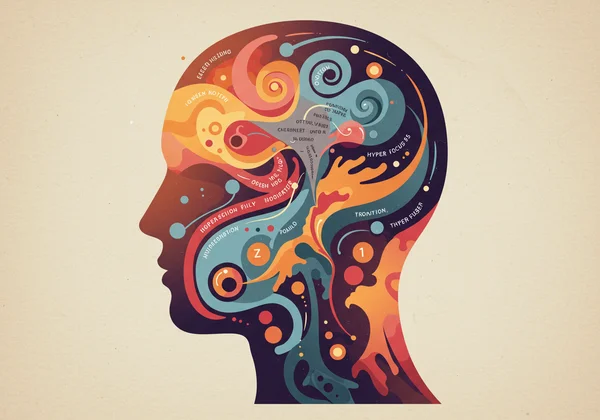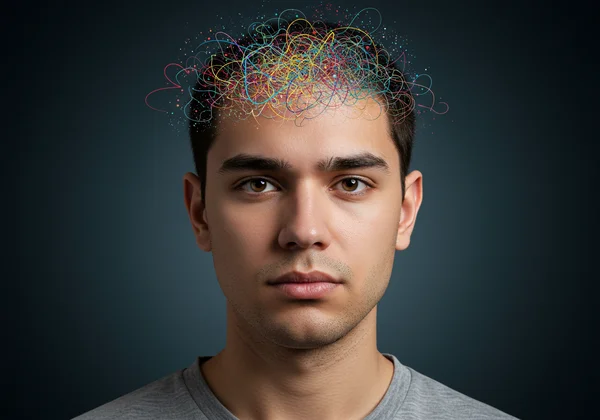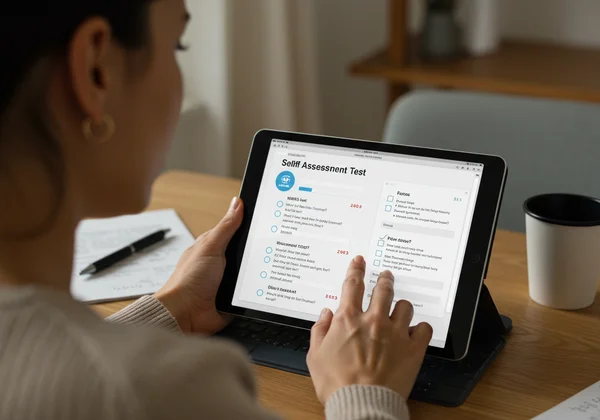ASRS Test Insights: 12 Overlooked Adult ADHD Symptoms
August 10, 2025 | By Miles Harrison
Ever wonder why you're always battling disorganization, intense emotions, or a restless mind? For many adults, these aren't just quirks, but subtle signs of Attention Deficit Hyperactivity Disorder (ADHD) they've never connected. This guide dives into 12 common, yet often missed, adult ADHD symptoms, helping you explore if these struggles resonate with your experience. What are the symptoms of ADHD in adults? This question is more complex than many realize, extending far beyond simple inattention.
If you recognize yourself in the descriptions below, remember that clarity is a powerful first step. A confidential and insightful way to begin exploring these patterns is by taking a free adult adhd selfreport scale screen, which can provide a valuable, personalized starting point for your journey of self-discovery.
Unveiling Overlooked Adult ADHD Symptoms
The classic image of ADHD is often a hyperactive child who can't sit still in class. However, in adults, the presentation can be vastly different and much more nuanced. Understanding these differences is key to recognizing the condition in yourself or a loved one. The journey to understanding often begins with a reliable adhd selfassessment.

Why Adult ADHD Signs Are Often Missed
Many adults with undiagnosed ADHD have spent their lives developing complex coping mechanisms to manage their symptoms. You might be the master of using five different planners, setting constant reminders, or relying on adrenaline-fueled, last-minute work sessions to get by. These strategies can mask the underlying challenges of ADHD, making the signs difficult for you and others to spot. Furthermore, hyperactivity in adults often turns inward, manifesting as a persistent feeling of internal restlessness rather than outward, disruptive behavior.

Beyond Inattention: A Broader Look at ADHD in Adults
While difficulty with focus is a hallmark of ADHD, the condition's impact is much broader. It significantly affects executive functions—the brain's management system responsible for planning, organizing, regulating emotions, and starting tasks. This is why many adults with ADHD struggle with emotional intensity and chronic procrastination, not just a wandering mind during meetings. Recognizing these broader challenges is crucial for a complete picture of ADHD in adults.
The 12 Common Yet Overlooked Symptoms of Adult ADHD
Here are the signs that often fly under the radar: These symptoms can impact work, relationships, and self-esteem, but identifying them is the first step toward managing them effectively.

1. Intense Emotional Dysregulation & Mood Swings
Do small frustrations cause you to feel overwhelmingly angry, frustrated, or sad? Emotional dysregulation is a core, yet often unrecognized, feature of adult ADHD. It’s a difficulty managing the intensity and duration of your emotional responses, leading to what feels like a constant emotional rollercoaster that can strain relationships and personal well-being.
2. Rejection Sensitive Dysphoria (RSD)
Rejection Sensitive Dysphoria, while not an official diagnosis, is a concept widely discussed in the ADHD community. It describes an extreme emotional sensitivity and pain triggered by the perception of being rejected, criticized, or teased. This can lead to intense social anxiety, people-pleasing behaviors, or sudden emotional outbursts following perceived slights.
3. Chronic Procrastination & Difficulty Starting Tasks
For many with adult ADHD, starting a task—especially a boring or overwhelming one—can feel like climbing a mountain. This isn't laziness; it's often a paralysis caused by issues with executive function. The brain struggles to prioritize and activate for the task at hand, leading to a cycle of procrastination, guilt, and anxiety.
4. Extreme Disorganization & Time Blindness
"Time blindness" is the persistent difficulty in sensing the passage of time. This can lead to being chronically late, underestimating how long tasks will take, and struggling to meet deadlines. Combined with challenges in organization, your physical space (like your desk or car) and your digital life (like emails and files) might feel perpetually chaotic.
5. Impulsive Decisions & Risk-Taking
Impulsivity in adults with ADHD doesn't always look like reckless daredevil behavior. It can manifest as impulsive spending, abruptly quitting a job, making significant life decisions without much thought, or oversharing in conversations. This stems from a reduced ability to pause and consider the long-term consequences of an action. If this sounds familiar, an online adhd screening could be a helpful step.
6. Hyperfocus: Deep Concentration on Specific Interests
Contrary to its name, ADHD isn't always a deficit of attention—it's more of an issue with regulating it. Hyperfocus is the flip side of distractibility. It’s an intense, prolonged concentration on a task or topic that is interesting to you, to the point where you may lose track of time and neglect everything else around you.
7. Inner Restlessness & Fidgeting (Beyond Physical Hyperactivity)
The boundless energy of a hyperactive child often transforms into a persistent inner restlessness in adults. You might feel constantly on edge, needing to be busy, or unable to sit through a movie without multi-tasking. This can also manifest as subtle fidgeting, like tapping your foot, doodling, or playing with your hair.
8. Difficulty Relaxing & Feeling "Always On"
A brain with ADHD is often described as a "motor that never shuts off." Even during downtime, you may struggle to quiet your thoughts and truly relax. This can lead to difficulty falling asleep, feeling perpetually wound-up, and choosing stimulating activities over restful ones, which can eventually lead to burnout.
9. Frequent Interrupting & Challenges with Listening
Do you find yourself finishing other people's sentences or blurting out an idea before they’ve finished speaking? This isn't rudeness but a common manifestation of impulsivity and a fast-moving brain. It can also be challenging to stay focused on what someone is saying, especially in long conversations or meetings.
10. Forgetfulness in Daily Life & Relationships
Forgetting appointments, misplacing keys, or failing to remember important details from a conversation are common experiences for everyone. However, for adults with ADHD, this level of forgetfulness is chronic and disruptive. It can impact work performance and cause significant strain in relationships when partners or friends feel unheard or unimportant.
11. Racing Thoughts & Mental Overwhelm
Living with an ADHD brain can feel like having too many browser tabs open at once. Thoughts can race, jump from one topic to another, and make it difficult to focus on a single train of thought. This mental chatter can be exhausting and lead to a state of constant overwhelm.
12. Sensory Overload & Hypersensitivity
Many adults with ADHD are highly sensitive to their environment. Loud noises, bright lights, strong smells, or even the texture of certain fabrics can feel incredibly distracting or overwhelming. This sensory hypersensitivity can make certain environments, like busy offices or crowded stores, feel exhausting and anxiety-inducing.
Recognizing These Signs: Your Next Steps
Reading this list might spark a mix of emotions – recognition, relief, or perhaps concern. It's incredibly validating to see your lifelong struggles articulated. Remember, these aren't character flaws; they could be signs of a neurodevelopmental condition.
The next step is to explore these feelings with a reliable tool. On our platform, we offer a private and confidential way to take the Adult ADHD Self-Report Scale (ASRS), a screening tool endorsed by the World Health Organization (WHO). Our platform provides not just a score, but a unique, AI-generated personalized report to help you understand your patterns more deeply. This can be an invaluable resource to take with you when considering a conversation with a healthcare professional. Take the asrs test today to gain clarity.

Frequently Asked Questions About Adult ADHD Symptoms
What are the symptoms of ADHD in adults?
The primary symptoms of ADHD in adults fall into two main categories: inattention (e.g., disorganization, forgetfulness, difficulty starting tasks) and hyperactivity/impulsivity (e.g., inner restlessness, interrupting others, impulsive decisions). However, as this article shows, these categories include many overlooked signs like emotional dysregulation, time blindness, and hyperfocus.
Do I have ADHD or am I just lazy?
This is a common and painful question. Laziness is a choice to avoid effort, whereas ADHD involves a neurobiological challenge with executive functions that makes starting and sustaining effort incredibly difficult, despite a genuine desire to do so. If you consistently struggle to do things you want to do, it's more likely a sign of an executive function challenge than a character flaw.
How to test yourself for ADHD?
While you cannot self-diagnose ADHD, you can take a preliminary step with a scientifically validated screening tool. The best way to start is with an established questionnaire like the Adult ADHD Self-Report Scale (ASRS). Our platform offers a free and confidential asrs test online that provides instant results and a detailed AI analysis to serve as a starting point for self-understanding and potential discussion with a doctor.
What does the ASRS test for?
The ASRS test is a screening questionnaire designed to assess the presence and severity of current ADHD symptoms in adults. It asks 18 questions based on the diagnostic criteria found in the DSM-5, covering topics like difficulty finishing projects, organizational challenges, fidgeting, and impulsivity. It helps identify patterns that are consistent with ADHD.
What feels like ADHD but isn't?
Several other conditions can have overlapping symptoms with ADHD. Chronic stress, anxiety, depression, burnout, and certain thyroid conditions can all cause issues with concentration, memory, and motivation. That's why it is critical to use a screening tool like the asrs v1.1 test as a first step, not a final answer, and to consult with a healthcare professional for a comprehensive evaluation.